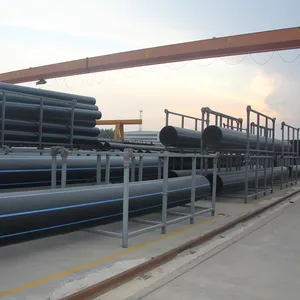
Top Quality Hdpe Pipe 90mm 500mm 280mm Plastic Tube SDR11 SDR 17 Pe 100 Pipe Hdpe Pipe With Competitive Price

Sdr9 Pn10 Pn16 Sdr 11 Sdr17 110mm 150mm 160 180mm 200mm 250mm 280mm 500mm 1500mm 4 16 18 32 Inch Hdpe Pipe Prices In Malaysia




















High-Density Polyethylene (HDPE) pipes are a versatile and durable solution for a variety of applications. The 32mm HDPE rolled pipe is a specific category within this product range, designed to meet the needs of businesses requiring robust piping solutions. This introduction will delve into the characteristics, applications, and benefits of this pipe type.
HDPE pipes, particularly the 32mm rolled variety, are known for their flexibility and strength. These pipes are manufactured through a process that ensures uniformity and reliability. The material's resistance to chemicals and corrosion makes it a suitable choice for transporting liquids and gases in industrial settings. Additionally, its low thermal conductivity minimizes heat loss, making it efficient for various temperature-sensitive applications.
The 32mm HDPE pipe is commonly used in sectors such as agriculture for irrigation systems, in construction for water supply lines, and in industrial settings for chemical transportation. Its adaptability also extends to mining operations, where it is used for slurry transport, and in municipal engineering for potable water distribution.
One of the main features of the 32mm HDPE rolled pipe is its seamless construction, which contributes to a lower incidence of leaks and a longer lifespan. The material's inherent flexibility allows for easier installation in challenging terrains. Users benefit from the pipe's lightweight nature, which reduces transportation costs and simplifies handling during installation.
The 32mm HDPE pipe is produced from ethylene, a byproduct of petroleum processing, which is polymerized to form the durable material known as HDPE. The production process is closely monitored to ensure the pipes meet industry standards for safety and performance.
Sustainability is a significant consideration in the production of HDPE pipes. The material is recyclable, reducing the environmental footprint associated with its use. Furthermore, the durability of HDPE pipes means they require less frequent replacement, contributing to resource conservation and waste reduction.